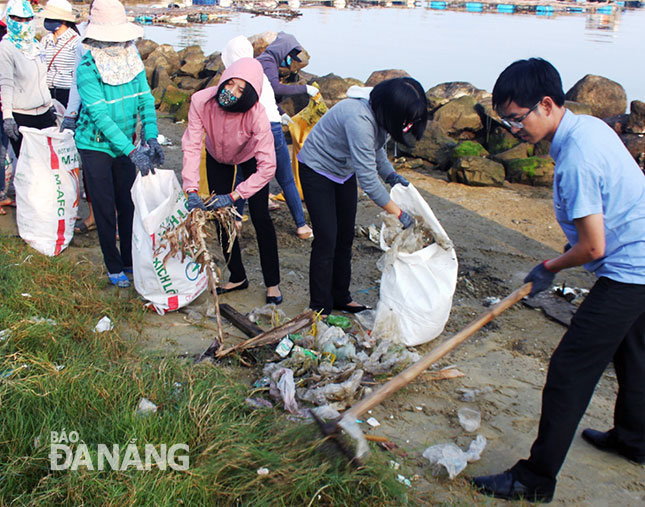Great efforts to promote 'white pollution' prevention
In active response to the ongoing action month for the environment in Da Nang, an arrays of practical environmental protection programmes have been taken place in the locality, drawing a great deal of attention and high praise from the general public.
 |
| Collecting plastic garbage washed ashore the Man Quang lagoon and west of Tho Quang Fishing Wharf |
Apart from the organisation of environmental cleanups, relevant local agencies are focusing on raising awareness of the harmful effects of plastic waste amongst local residents, and encouraging them to use biodegradable products in a bid to mitigate the ‘white pollution’.
It is no denying that plastic products bring convenience, but also produce a huge disastrous thing called ‘white pollution’, which has become a major issue in today's world.
‘White pollution’ refers to solid waste which comes from the usage of various types of life plastic products.
They are made from polystyrene, polypropylene, PVC and other polymers. It is difficult to degrade and dispose of resulting in severe urban environmental consequences.
Most plastic bags, which are a major source of pollution in the country, serve for around 10 minutes, and take up to a millennium to degrade.
Currently in the market, plastic bags cost much less than the biodegradable ones. So, plastic bags are still heavily used across Viet Nam, from traditional markets to supermarkets and shopping malls.
In an attempt to reduce the use of plastic bags in a bid to protect the environment, in 2017, the biodegradable bags subsidy programmes started to deploy at a total of 11 traditional markets across the Thanh Khe District.
Each subsidised biodegradable bags are priced at only 25,000 VND per kg, 5,000 VND lower than nylon ones.
Biodegradable bags are bags that are capable of being decomposed by bacteria or other living organisms.
Producers of biodegradable bags say they are made from high-density polyethylene (HDPE) and decompose into powder in 3 to 9 months before fungi and microorganisms consume the powder.
Without any doubt, biodegradable plastics are better for the environment. While they do less harm to the earth, on the other hand when recovering fossil fuels this process releases very few greenhouse gas and harmful carbon emissions. Moreover, biodegradable plastics don’t need oil for their manufacturing, like the other plastics. Hence, it causes less pollution to the environment. So, these were some of the reasons which make biodegradable plastics significant in the world of packaging today. They are of great importance for the future of the planet.
Encouragingly, there has been a downward trend in the use of nylon bags in the markets of Cam Le, Hoa An, Hoa Phat, Hoa Cam and Hoa Xuan in Cam Le District.
To date, a total of 5,000 traders at traditional markets have provided their shoppers with biodegradable bags, instead of plastic ones. Also, they have also been actively involved in plastic waste collection.
The city is aiming to reduce the total amount of nylon bags by 65% by 2020 at supermarkets and shopping malls, and by 50% at traditional markets across the locality.
Mr Le Quang Nam, the Director of the municipal Department of Natural Resources and the Environment, said, such simple deeds as promoting the use of eco-friendly bags in place of plastic bags and reduce consumption of single-use plastics are considered as solutions to the environmental pollution in the city, and across the entire globe as a whole.